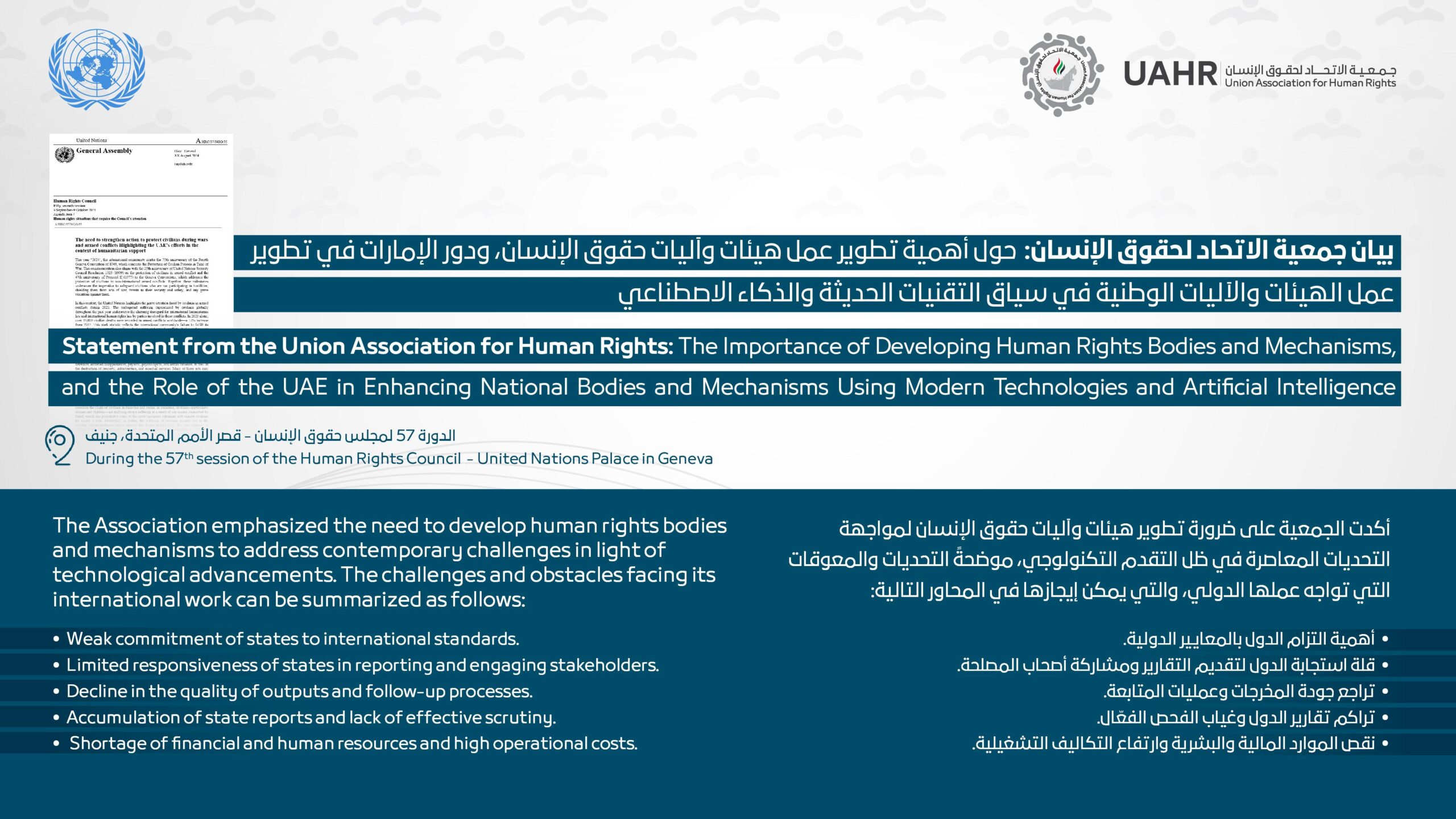26
Dec
2024
2024 | 57th session of the Human Rights | Human Rights Council | Written Statements
The importance of boosting the work of human rights agencies and mechanisms and praising the UAE’s efforts in developing national bodies and mechanisms in the context of modern technologies and AI

About the Statement
A written statement was issued by the Union Association for Human Rights (UAHR), in cooperation with a consultative organization, under document number A/HRC/57/NGO/56. The statement, submitted to the Human Rights Council at its 57th session (September–October 2024), focuses on the importance of advancing international human rights mechanisms and bodies by integrating technological transformation and artificial intelligence applications. It highlights the United Arab Emirates as a global model in modernizing the technological infrastructure of these bodies, thereby enhancing their effectiveness and responsiveness to contemporary challenges.
Statement Content
- The statement highlights structural challenges facing international human rights mechanisms and bodies, including:
- Low levels of state compliance with international reporting and mechanisms;
- Weak follow-up and implementation of recommendations;
- Declining quality of outputs and reports; and
- Severe shortages in human and financial resources.
- It emphasizes the importance of leveraging technological advancements to overcome these obstacles.
Institutional and Historical Framework: The statement draws on several foundational references, including:
- UN General Assembly Resolution 5/1 (2007) on human rights bodies and mechanisms;
- The Dublin Process initiated by the UN High Commissioner for Human Rights in 2009;
- The 2012 OHCHR report on “Strengthening the United Nations human rights treaty body system,” which emphasized the recommendation to use technology to enhance the effectiveness of mechanisms; and
- Ongoing joint cooperation efforts between the High Commissioner and states to improve the performance of international bodies.
Call for Modernizing Mechanisms Through Technology: The statement stresses the need to:
- Develop intelligent and interactive central databases;
- Accelerate procedures and reduce operational costs;
- Improve governance and enhance accountability; and
- Strengthen responses to complaints and violations using effective digital tools.
Highlighting the UAE’s Experience: The statement commends the United Arab Emirates for its efforts to modernize the human rights system domestically, including:
- Integrating artificial intelligence into national human rights institutions;
- Establishing a Ministry of Artificial Intelligence and advanced entities such as G42 and Mohamed bin Zayed University of Artificial Intelligence (MBZUAI);
- Hosting the AI for Good Global Summit in 2024; and
- References from the US–UAE. Business Council report, which identified the UAE as a global leader in artificial intelligence.
Recommendations: The statement calls on the Human Rights Council to:
- Adopt targeted development plans to enhance the effectiveness of international bodies;
- Integrate modern technologies and artificial intelligence into working mechanisms;
- Strengthen governance through digital transformation; and
- Establish strategic international partnerships, particularly with the UAE as a leading model in technological infrastructure and rights-based applications of AI.
Significance of the Statement:
- The statement presents a forward-looking vision for modernizing the UN human rights system through the use of advanced technologies;
- It addresses the structural challenges of international human rights bodies at their core; and
- It highlights the United Arab Emirates as a global model in digital governance and the application of artificial intelligence to advance human rights causes.

